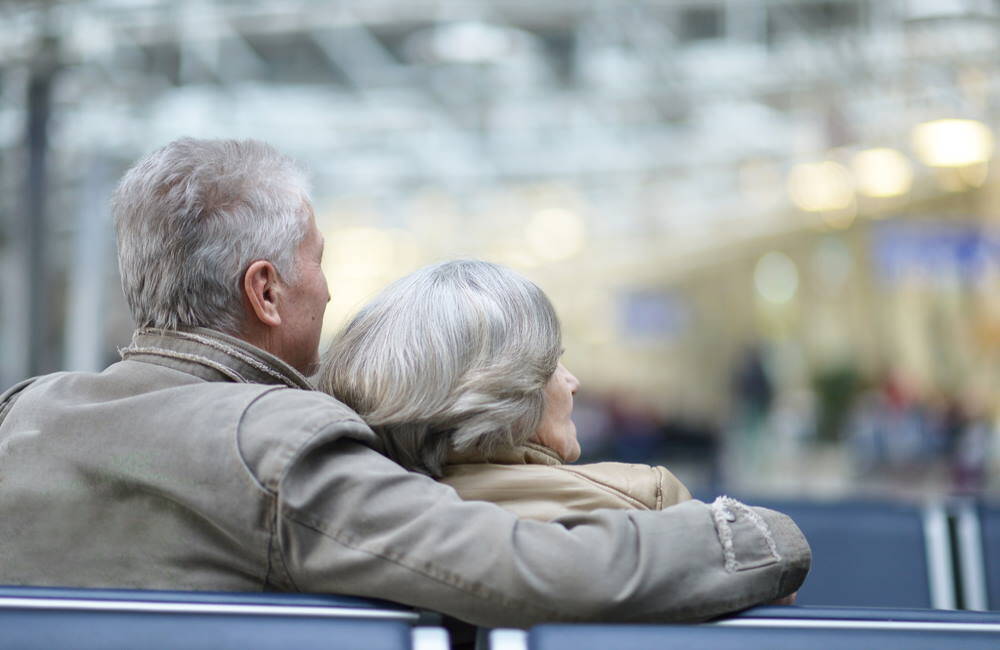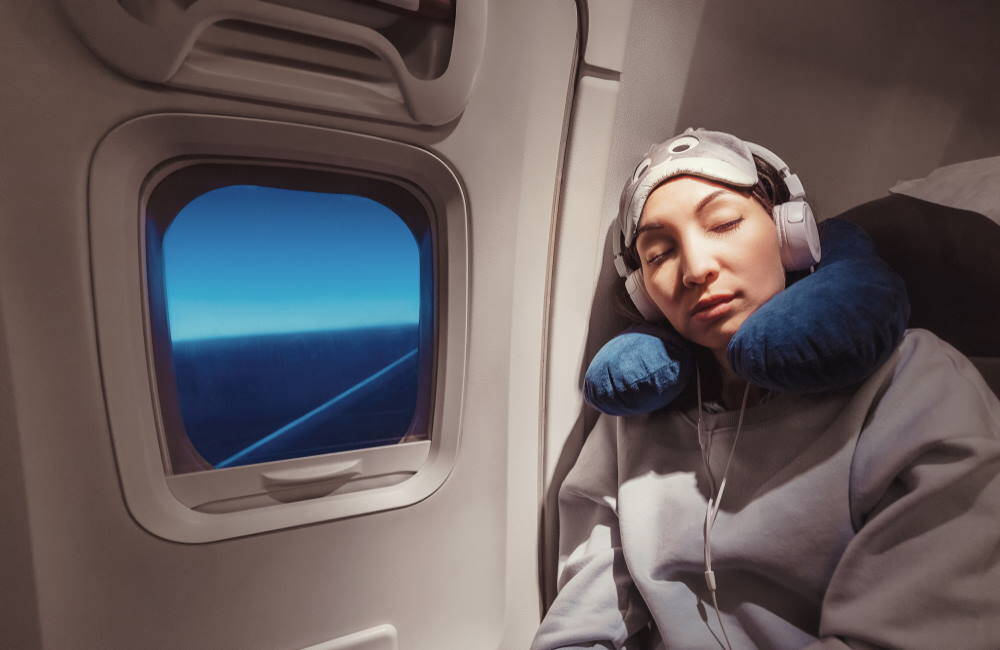
by Flying Angels Editorial Team | News & Resources
Having Parkinson’s disease should not keep you from traveling. While it requires planning ahead and following smart guidelines, you can fly with Parkinson’s disease and enjoy a stress-free traveling experience.
Too often, those with Parkinson’s may feel they have to limit or even cancel travel plans. Certainly, you cannot make up plans on the fly as you those who do not have Parkinson’s may do. However, planning ahead is worth doing to enjoy the ability to fly with Parkinson’s disease.
Can I Hire a Nurse to Fly With Me?
What Is Parkinson’s Disease?
For those who are planning a trip for someone with Parkinson’s disease, it’s important to understand how it impacts the body. Parkinson’s is a nervous system disorder that worsens over time. It typically starts with small tremors in the hand. Eventually, the tremors increase in frequency and duration.
Symptoms include severe muscle cramps, impaired posture and balance, difficulties with speech and overall slowed movement. But none of these should make it impossible to travel. The key is planning ahead to deal with any potential issues.
As a person with the disease wrote for the Parkinson’s Foundation: “While traveling with Parkinson’s disease may not be a spontaneous, carefree experience, you can still enjoy a wonderful time away with some advance planning and preparation.”
How to Fly With Memory Loss or Dementia
How to Safely Travel with PD
If you want to fly with Parkinson’s disease, the first step is committing to following certain steps that can make a trip much safer and easier to manage. They include the following from the Parkinson’s Foundation and Web MD.
Book a non-stop flight. You don’t want the hassle of changing planes in a busy hub airport like the ones in Atlanta or Dallas.
Travel with a companion. It helps to have someone along who understands your condition, including a good friend, family member or flight nurse.
Carry important information. Make sure to carry the name of your doctor, insurance company, emergency contact and list of medications on your person in a wallet, purse, travel bag, etc. Also, carry something that clearly states you have Parkinson’s disease.
Use backpacks. You want your hands free to better maintain balance. You can manage this by using a backpack (or a fanny pack, if that is more comfortable) Also, always carry a snack and water in your backpack to take with medications.
Stay comfortable. Wear loose-fitting clothes and walking shoes that fit well. Also, sit near the bathroom on your flight to limit having to walk the length of the plane. Better yet, use the bathroom before you board so you can skip the cramped airplane bathroom completely.
Map it beforehand. Thanks to Google Earth, you can now go online and see images of roads and entrances around airports. You can also look at maps of the interiors of your departure and arrival airports. Find where you can use shuttles rather than walk, and remember you can contact the airport ahead of time to get a wheelchair. This can help you map out a course before you even leave the house.
Always leave early! You want more than enough time, not less.
Charge your phone. You don’t want to have to waste time trying to find a place to recharge your phone in the airport.
TSA Travel Tips for Disabled Travelers
Tips on Medication
It’s important to take steps that will keep your medications safe and easy to access.
- Pack your medication in a carryon bag, not a bag you plan to check
- Bring more medication than you think you will need for the trip
- Bring a prescription for refills
- Keep all medication in the labeled, original container to make it easier to get a refill and get through security
- Before leaving, talk to your doctor about medications you can or cannot take for common trip-related illnesses such as motion sickness or nausea
- Find out if any of your medications are sun sensitive
- Account for time changes, if needed, to take your pills at the right time
If you want to fly with Parkinson’s disease, you can. These simple ideas can get you started on the right path for planning an enjoyable and safe trip. There’s no reason not to visit loved ones or see a place you always wanted to see!
What is Air Travel Assistance for Seniors?

by Flying Angels Editorial Team | News & Resources
While it presents challenges, it’s possible to fly with cystic fibrosis if you plan ahead and carefully follow all the important safety guidelines. Those with cystic fibrosis should not let concerns about travel keep them from taking a vacation or traveling to see loved ones.
The following looks at some of the issues those with CF should keep in mind as they plan for their trip. Whether they do the trip on their own or travel with a flight nurse, these ideas can help better prepare you to fly with cystic fibrosis.
Can I Hire a Nurse to Fly With Me?
Talk to Your Medical Experts
Most people can safely fly with cystic fibrosis. However, some may require carrying oxygen with them. High altitudes can make it more difficult to breathe, especially for those with CF. Your CF health team may want to conduct a high-altitude test to determine if you will need to travel with oxygen. This also is the time to find out the closest CF care facility to your destination.
Packing Medications
The Cystic Fibrosis Foundation provides detailed information on traveling with medication and medical equipment. All medications should get packed in their original containers with clear labels. It’s wise to bring a few extra days of medications in case luggage is delayed or lost. Bringing an extra prescription also provides a backup plan in case your supply runs short.
If you must keep your medication cool, you will need to bring an insulated medical ice pack on the flight. Also, call ahead to your hotel and ask for a refrigerator to store your medication. They sometimes do not charge for this service if they know in advance it is for medication.
Flying with Oxygen & Medications
Health Documentation
Those who fly with cystic fibrosis need an extensive list of health documentation. This includes the following.
- A health summary your doctor signs that provides an overview of your health. It should include your name and date of birth, contact information for your CF care center, known allergies, list of medications and daily therapy.
- Any documentation you need to carry oxygen on your flight. The forms required vary from airline to airline, so it’s important to contact them well in advance and find out what you need.
- If you plan international travel, you may need a customs certificate from your doctor explaining why you need the medical supplies you have for your journey. This should include your name and date of birth, a description of CF, list of your medications, and all medical supplies you have packed for your travel.
- If you plan to visit a theme park, you may need documentation to get a special pass that allows you to skip long lines. You can find out what you need by contacting the theme park in advance.
What is a TSA Notification Card?
Packing Medical Supplies
You should make a list well in advance of the supplies you need for your trip. This should include oral and inhaled medications, vest, nebulizer compressor, neti pot, nutritional therapies and devices (such as a glucose monitor, needles, testing strips, alcohol pads and instruction manuals).
Other items to consider when packing:
- Emergency contacts
- List of doctors who specialize in CF at your destination
- Insurance information (including travel insurance)
- Prepaid phone card to contact your own CF center in case of emergency
- Instructions for medical equipment in case of malfunction
- A calendar of times and details on taking your medications to help those with you if needed
Medical Travel Insurance vs Trip Insurance
During the Flight
Always bring medical equipment onboard your flight, do not attempt to check it. Airlines should not count needed equipment against your allotted number of bags you can carry on a flight. Keep in mind, however, that it must fit under the seat or in overhead storage. Ask to pre-board a flight so you can store all needed supplies without the crush of other passengers. If you have all proper documents, you should have no problem getting everything through airport security and onboard.
Other things to keep in mind during your flight include the following.
- Keep medication with you, including insulin and supplies.
- Watch our sugar levels, and have carbohydrates with you to prevent hyperglycemia and hypoglycemia. Let your traveling companions know the signs of a drop or spike in blood sugar
- Bring snacks with you on your flight, as well as glucose tablets
- Stay hydrated and limit alcohol consumption. Add a pinch of salt to water, or drink energy drinks with salt supplements
- Use diet supplements to ensure you eat the right amount of calories
Some Activities That May Pose a Risk
When thinking about where you want to fly and what you can do when you get there, the CF Foundation provides a list of activities that could pose a problem. They include bungee jumping, which causes rapid pressure changes in the lung, as well as scuba diving and spending time in Jacuzzis or hot tubs. Keeping these ideas in mind can help you safely fly with cystic fibrosis. While it takes a great deal of planning, it pays off in being able to enjoy travel, knowing you have taken all the proper steps.
What Should I Eat Before a Flight?

by Dan McCormick
Medical Transport Simplified Download the Guide I’m interested in Travel for MyselfIf you need some help while traveling, Flying Angels can take the worry out of travel. If you’re elderly, handicapped, or on oxygen, our experienced flight nurses will handle...

by Flying Angels Editorial Team | News & Resources
Medical travel companions fly with travelers who need assistance to complete their journey. They make the trip from Point A to Point B easier for those with injuries, disabilities and older travelers who want support when flying to national or international destinations.
Adult children also often hire medical travel companions to fly with their senior parents who might have some physical limitations or who may simply get confused or uneasy with the hustle and bustle of the airport and airplane.
While many types of medical travel companion services are available, making the journey with a flight nurse provides travelers with a trained medical professional who is highly skilled in providing medical care on commercial flights and for those who need a long distance ambulance.
Can I Hire a Nurse to Fly With Me?
The Benefits of Medical Travel Companions
People with medical conditions cannot always make flights on their own. Having a flight nurse or medical travel companion gives those who need support during air travel a number of benefits.
In the case of flight nurses, each one is experienced with working in emergency situations, making them able to handle whatever situation might arise. They also have earned certification for providing medical services at high altitudes.
Many flight nurse companies can also make trip arrangements. This includes ground transport to and from the airport, assistance through the terminal (including security) and ensuring all needed medical equipment and medications travel with you.
Overall, the biggest benefit of a medical travel companion is the peace of mind of knowing you have professional, caring assistance for your journey.
TSA Travel Tips for Disabled Travelers
Who Needs a Medical Travel Companion?
Medical travel companies can provide vital support in a number of situations.
Senior Travel
As people age, running the gauntlet of lines, security checks, ticket kiosks, and crowds of people hustling quickly through the terminal and at the gate can become overwhelming. A flight nurse can make the process much less complicated, providing a steady companion who guides you through every step along the way in the airport. They also take away any concerns about the handling of medical equipment and prescription medications (including remembering to take them when required).
How to Fly With Memory Loss or Dementia
Injuries
Traveling with a broken arm or leg, especially if a wheelchair is required, makes air travel difficult even for the youngest and healthiest of travelers. A medical travel companion can navigate the journey for you while also ensuring that your injury receives proper attention.
Get Help Leaving the Hospital After Discharge
Disabilities
Those with disabilities typically become experts at getting through whatever life throws at them, but travel can provide a particularly strong challenge. A flight nurse can provide assistance when needed and also contact airport officials ahead of time to work out any special arrangements involving equipment or security.
Getting Home
For those who become ill or get injured while on vacation, a flight nurse can make the journey home much easier, including handling communication with medical personnel, even those in other countries. Clients can engage the services of a medical travel companion for domestic and international flights. Whatever your reasons for wanting a flight nurse with you, they can make your journey much less stressful and ensure you arrive at your destination safely while attending all your medical needs.
Medical Repatriation vs Evacuation

by Flying Angels Editorial Team | News & Resources
Is it possible to fly after a traumatic brain injury? Even considering flying after such a serious event seems risky, but it’s typically safe after a certain amount of time passes and a doctor gives you the OK and you seek the support you need to make the air travel experience less stressful.
Much like those who want to fly after a heart attack or fly with COPD, just the idea of trying to fly after a traumatic brain injury (TBI) seems intimidating. The key is in planning travel after a TBI that takes into account what you will need for a safe flight as well as getting the proper support.
Can You Fly After a Heart Attack?
What is a Traumatic Brain Injury?
The official definition of traumatic brain injury is any sudden event that causes injury to the brain. The most common events that lead to a TBI include bad falls (for example, from a ladder or down a flight of stairs), car accidents, sports injuries and, for members of the military, explosions and other combat injuries.
Some of the symptoms of TBI, according to the Mayo Clinic, include:
- Headache
- Nausea
- Fatigue
- Difficulties with speech
- Trouble sleeping
- Confusion and agitation
Clearly, any of those could make it difficult to fly after a traumatic brain injury. However, time and medication can help with these issues. Most experts believe that flying is generally safe if it’s done at least 10 days after the brain injury. That varies, depending on the health of the patient before the incident and the exact nature of the brain injury.
It’s also crucial to get an opinion from your doctor before deciding to fly after a traumatic brain injury.
How Non-Emergency Medical Transport Can Help TBI Victims
If a doctor gives the green light for flying, then the next important step is to get the support you need for the flight. By flying with a flight nurse affiliated with a non-emergency medical transport (NEMT) company, TBI patients can better handle all the details of airplane travel. A NEMT company and flight nurse offer support to TBI patients in a number of areas, including the following.
Medical Transportation Options Explained
Making Flight Arrangements
TBI patients don’t have to worry about booking flights, dealing with airport personnel or handling the details of getting medications through security. A NEMT company handles all your travel arrangements and works with the airports and airlines to make your trip go as smoothly as possible.
How Do You Book Medical Travel?
Tracking Medications
Most TBI patients carry medications to deal with the symptoms listed above, as well as other TBI-related issues. A flight nurse will handle the transport and administering of medications throughout your trip, taking a major burden off your hands (and a lot of worry off your mind).
Expertise in Flight Healthcare
Flight nurses, in addition to training in emergency room settings, also have knowledge, skills and experience in providing healthcare at high altitudes. They understand the impact that flying can have on all medical conditions, including brain injuries. They will be ready to provide any care needed throughout the flight.
What is Aviation Physiology?
Peace of Mind
It’s impossible to quantify the peace of mind people experience having a Flight Coordinator handle all the travel-related bookings and a flight nurse to oversee care during the trip. Just the relief from anxiety that TBI patients experience can make having a flight nurse along worthwhile.
With a doctor’s clearance, it’s possible to fly after a traumatic brain injury. But TBI patients should also seek assistance to make the experience go much more smoothly. A flight nurse is an outstanding choice in this regard.
Get Help Leaving the Hospital After Discharge





